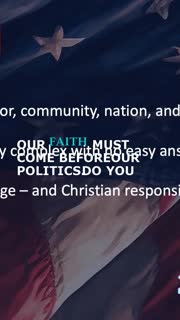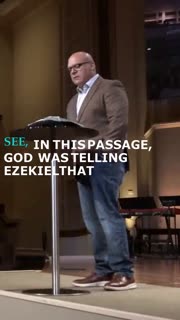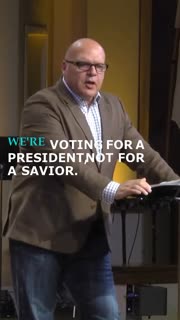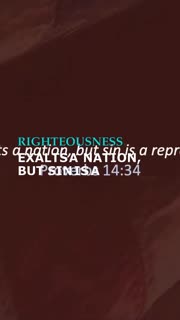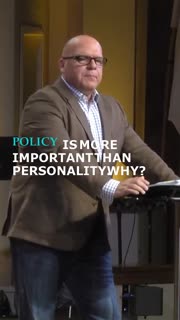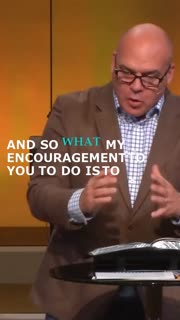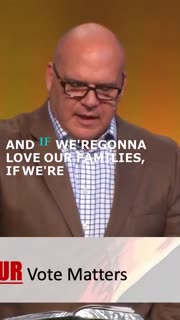Faith Over Politics: A Call to Righteous Voting
Devotional
Sermon Summary
Bible Study Guide
Sermon Clips
1) "Our faith must come before our politics. Do you hear that? Say it with me. Our faith must come before our politics. And that gets to the last thing. We must never forget that no matter who you vote for, who becomes president, who becomes governor, who becomes senator, this is really important, not one of them is going to save us. Not one of them. Our hope and our trust for our nation must be in God. And we must bend our knee and bow our hearts to him no matter what." [35:14] (35 seconds)
2) "See, in this passage, God was telling Ezekiel that he had called him to serve as a watchman to warn the people of his impending judgment because the people of God were drifting away from the things of God. And he looks at Ezekiel and says, Ezekiel, you're the watchman. And if you don't sound the trumpet and my judgment comes, then there will be no judgment. Their blood is on you, but you must give the warning so that it's on them. It made me think of a quote by William Wilberforce who said, let it not be said that I was silent when they needed me." [37:54] (39 seconds)
3) "We're voting for a president, not for a savior. And so we have to be careful not to confuse patriotism and national pride and Western culture with biblical Christian faith and practices. See, I don't know about you, but I already have a savior, and his name is Jesus. And aren't you glad it's not Trump? And aren't you glad it's not Harris? And aren't you glad it's not Trump? And aren't you glad it's not the Democratic Party? And aren't you glad it's not the Republican Party? See, my savior stretched out his arms and died on an old rugged cross because it was the only solution to the problem of sin. And because of that, he's the only solution to the problems of our nation." [47:20] (43 seconds)
4) "Righteousness exalts a nation, but sin is a reproach to any people. Righteousness exalts a nation. Not a leader, but the righteousness, the desire of the people who desire the righteousness of God. That's what exalts a nation. But sin is a reproach to any people. What it means is that the fate of a nation is on its citizens as much as it is on their leaders. It means God has called us to be salt and light. Salt to preserve the decay that's going on in our nation. And light to shine truth where there's darkness." [49:26] (38 seconds)
5) "Policy is more important than personality. Why? Number one, because the personality is going to be gone in four to eight years. But their policies will not be. Their policies are going to go on. We still have the policies of FDR called Social Security. We have the policy of Obama of the Affordable Care Act. We have all kinds of policies. I could sit here and lay them out from one president after another president after another president because their policies last far longer. Than the person. And so it's important that we educate ourselves. That we know why each candidate, why each party values and believes what they believe. We need to understand their policies. And then we need to compare their policies to scripture." [53:11] (54 seconds)
6) "And so what my encouragement to you to do is to get out your Bible, to pray, and then look at these policies, compare them to what the scripture says, become biblically informed so that when you are done, you can say, this is the best, this is the best decision I can make that would honor God. That's my encouragement." [01:01:10] (21 seconds)
7) "And if we're gonna love our families, if we're gonna love our neighbors, if we're gonna love our nation and the nations of the world, then every Christian should and must vote. Every Christian, it matters. So how do we vote? Some of you say, do I vote my conscience? Well, that depends on your conscience. Do I vote my morals and my values? Well, that depends on your morals and your values. What I would suggest is that as a follower of Jesus, you vote as closely as possible on the basis of scripture and on the basis of a biblical worldview that you believe would honor Jesus. That's what I think we do." [01:01:48] (43 seconds)
Ask a question about this sermon
2) "See, in this passage, God was telling Ezekiel that he had called him to serve as a watchman to warn the people of his impending judgment because the people of God were drifting away from the things of God. And he looks at Ezekiel and says, Ezekiel, you're the watchman. And if you don't sound the trumpet and my judgment comes, then there will be no judgment. Their blood is on you, but you must give the warning so that it's on them. It made me think of a quote by William Wilberforce who said, let it not be said that I was silent when they needed me." [37:54] (39 seconds)
3) "We're voting for a president, not for a savior. And so we have to be careful not to confuse patriotism and national pride and Western culture with biblical Christian faith and practices. See, I don't know about you, but I already have a savior, and his name is Jesus. And aren't you glad it's not Trump? And aren't you glad it's not Harris? And aren't you glad it's not Trump? And aren't you glad it's not the Democratic Party? And aren't you glad it's not the Republican Party? See, my savior stretched out his arms and died on an old rugged cross because it was the only solution to the problem of sin. And because of that, he's the only solution to the problems of our nation." [47:20] (43 seconds)
4) "Righteousness exalts a nation, but sin is a reproach to any people. Righteousness exalts a nation. Not a leader, but the righteousness, the desire of the people who desire the righteousness of God. That's what exalts a nation. But sin is a reproach to any people. What it means is that the fate of a nation is on its citizens as much as it is on their leaders. It means God has called us to be salt and light. Salt to preserve the decay that's going on in our nation. And light to shine truth where there's darkness." [49:26] (38 seconds)
5) "Policy is more important than personality. Why? Number one, because the personality is going to be gone in four to eight years. But their policies will not be. Their policies are going to go on. We still have the policies of FDR called Social Security. We have the policy of Obama of the Affordable Care Act. We have all kinds of policies. I could sit here and lay them out from one president after another president after another president because their policies last far longer. Than the person. And so it's important that we educate ourselves. That we know why each candidate, why each party values and believes what they believe. We need to understand their policies. And then we need to compare their policies to scripture." [53:11] (54 seconds)
6) "And so what my encouragement to you to do is to get out your Bible, to pray, and then look at these policies, compare them to what the scripture says, become biblically informed so that when you are done, you can say, this is the best, this is the best decision I can make that would honor God. That's my encouragement." [01:01:10] (21 seconds)
7) "And if we're gonna love our families, if we're gonna love our neighbors, if we're gonna love our nation and the nations of the world, then every Christian should and must vote. Every Christian, it matters. So how do we vote? Some of you say, do I vote my conscience? Well, that depends on your conscience. Do I vote my morals and my values? Well, that depends on your morals and your values. What I would suggest is that as a follower of Jesus, you vote as closely as possible on the basis of scripture and on the basis of a biblical worldview that you believe would honor Jesus. That's what I think we do." [01:01:48] (43 seconds)
